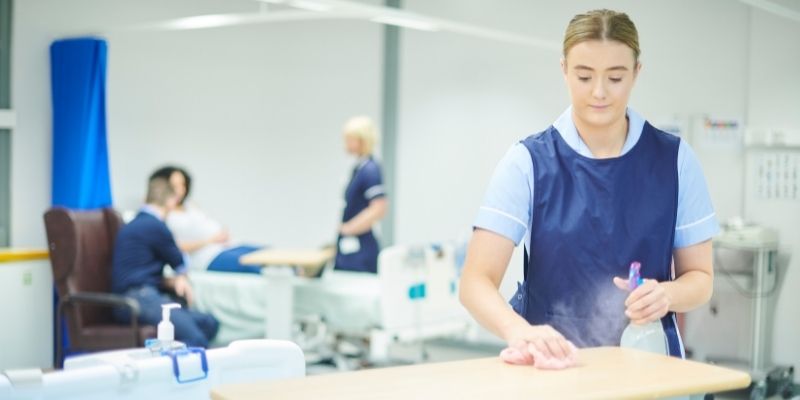
Humans have dealt with all manner of infections throughout history. From plagues and pandemics to flu and viruses, we have had to adapt and change our ways to better prevent the spread of infectious agents.
While we learn more about infection prevention and control, increased globalisation makes it more of a challenge to keep on top of the spread as there are so many more modes of transmission to consider. Should an outbreak of a serious infection or disease occur, it can literally be around the world in a matter of days.
Thankfully, there are a host of infection control methods that help us maintain a minimal infection rate. UK residents themselves are practising better hygiene as the modes of infection transmission are more publicly documented, and health professionals adhere to strict guidance from authorities like the Centers for Disease Control and Prevention (no follow) to keep us safe.
Germs are an unavoidable part of life, but if we take the time to learn more about disease prevention, we can help keep ourselves and others safe from illness. If you’re asking yourself ‘What is infection control?’ or ‘How is infection spread?’ keep reading. We have detailed the 5 different ways infections can spread and what you can do to prevent them.
Ever Wondered How Infections Spread?
Before you can reduce your risk of contracting infections it is vital to know how they can spread.
An infection is caused by bacteria and viruses, that wouldn’t normally be present in the body, invading the body. These bacteria and viruses are found in the environment (air, soil, water) as well as on and in humans, from body secretions to the little, tiny droplets that are formed from sneezing, coughing and breathing.
Three things need to take place for an infection to manifest, these are:
A Source
A person or environment harbouring an infectious agent or germ. Human sources often include healthcare patients and workers, whereas environments can be dry or wet surfaces, moist environments, medical devices, among others.
A Susceptible Person
An individual who isn’t vaccinated or has none or limited immunity.
A Mode of Transmission
The way germs are transported to the susceptible person.
To keep UK infection rates at their lowest, the best practice approach is to target each aspect that leads to infections spreading. Scientists, medicine and healthcare professionals all do their bit to eliminate the source of infection and boost the immunity of susceptible people. However, we can all play a part in minimising the mode of transmission.

If you’re wondering ‘How can infection spread?’, transmission occurs through:
- Physical Contact
Infections, especially skin contagions, are commonly spread by direct physical contact. Direct contact means that infections are passed on from one person to another when their bodies touch.
Infections like ringworm are spread when children play together, and the infected area of a child is touched by another. Other infections like chickenpox, cold sores and HIV can be passed on by kissing, touching and sexual intercourse.
This is why practising good hygiene is the most basic, yet incredibly important disease prevention method for both adults and children, as it kills the microorganisms that carry infections and disease.
- Droplet Spreading
Colds, strep throat etc. are caused by germs found in saliva and excretions of the nose. Sneezing, runny noses, coughing or other modes of projecting droplets of secretions are a common way of spreading germs.
Young children experience colds and other non-major viruses, such as eye infections and those occurring in the nose and throat, more frequently than adults. This is why following thorough infection control practices with children is very important because the respiratory viruses in the throat and nose of children can be present for days before they start to show any symptoms of illness.
Another common occurrence of droplet spreading in healthcare is in dentistry when rotating medical devices are used during procedures. These cause droplets to spray out of the patient’s mouth and become airborne.
When projected, these germ-filled droplets can land in another person’s mouth, eye or nose and can also be inhaled. They can also land on nearby surfaces that can be touched by others in the vicinity.
This is why there are standard precautions for infection control within healthcare facilities and other workplace environments. Though as individuals, we should also be mindful of covering our mouths and nose when we sneeze or cough to prevent the spread of infection.
- Contaminated Items
People can also be infected by contaminated everyday items like bedsheets, toys, even water and food. In healthcare facilities, this is amplified as medical devices and equipment more frequently come into contact with infected bodily fluids.
Because of this, all these objects and appliances must be correctly disinfected, sterilised and cleaned. In addition to all food, water and other consumables being stored and prepared safely and hygienically.
- Bowel Movements
The germs that cause diarrhoea and other more serious excreta-related diseases like cholera, typhoid and polio are found in faeces. Water, hands, food, surfaces and other objects can be contaminated by faeces quite easily, as a result of bad personal hygiene.
Why intestinal contagions are so easily spread is because some germs can live on objects and surfaces for prolonged periods of time. As such, the most effective way of preventing the spread of these germs is by correct hand washing(no follow) in addition to a daily personal hygiene routine.
- Exposure to Blood
Skin acts as a barrier to prevent contact with blood. However, when skin is broken, or blood-like bodily fluids are passed on, infections can spread by blood-to-blood direct contact or direct contact with the eyes or mouth.
The smallest amount of blood can cause the spread of infections. So, it is important that whenever any blood or blood-like bodily fluids are present, gloves and other personal protective equipment (PPE) should be worn during the time of exposure and within the cleaning process. Should encounters be of a sexual nature, participants should use appropriate STI protection.
Ways to Reduce the Spread of Infections
There are several ways you can help to reduce the risk of spreading infections and lowering UK infection rates:
- Getting vaccinations and having booster jabs
- Disinfecting surfaces in your home and workplace
- Disposing of tissues after use
- Washing your hands frequently, but also directly after sneezing, using tissues, coughing or using the toilet
- Avoiding sharing cutlery, dishes, glasses and cups that have not been properly cleaned
- Staying at home when sick
- Avoiding touching your eyes, mouth and nose
- Allowing children to play where surfaces can be cleaned easily
- Practising general good hygiene
A healthy dose of germs is good for our immune system and most infections can be treated fairly easily. However, we all need to do our bit to prevent the spread of more serious infections and diseases. You can make sure you are doing everything in your power to stop the spread of infection by completing infection control training.

Professional Roles Dedicated to Infection Control
In the interest of public safety, there are a host of professional roles that are dedicated to infection prevention and control. Naturally, many of these exist in healthcare departments, but there are also professionals who perform infection control duties in other everyday environments.
Different jobs that are highly focused on infection control that you could pursue include:
Cleaner
Utilise specific chemicals, solutions and apparatus to sterilise and clean a variety of environments, from offices to hospitals and public buildings.
Infection Control Nurse
Registered nurses who specialise in developing and implementing infection prevention and control techniques in healthcare departments. You could implement heightened infection control in care homes, intensive care wards and operating theatres.
Health and Safety Officer
While performing duties that protect against the entire set of risks posed by your work environment, part of this is having a duty of care to monitor and act upon infection control policy and procedures.
Restaurant Manager
In addition to managing the whole restaurant operation, you would also ensure that standards for purchasing, receiving, keeping and preparing food and drink were met so that customers consume safe high-quality food and beverages.
Hospital Manager
Oversee the everyday execution of fundamental hospital functions that affect medical staff and patients, part of which is making sure infection control NHS or private hospital guidelines are adhered to.
Epidemiologist
Study how infections and diseases are both caused and transmitted. In this role, you will perform research and collect data that you will report on, from which key data will be provided to front-line doctors and policymakers. As such, you will be crucial in the development of techniques that help detect, understand, contain and prevent the further spread of infection.
Study Infection Control Online
If you’re curious about the cause of infections, how they spread and how infections can be prevented, you can study courses online that will build your knowledge and prepare you for any number of important careers.
Whether you aspire to prevent infections in healthcare environments, research the cause of infectious pathogens and diseases or learn how to reduce infection rates on a global scale, our distance learning course can help.
Stonebridge Associated Colleges is one of the leading UK distance learning providers, helping thousands of students achieve their academic and career goals. From health and safety courses to those that help you on the way to studying a healthcare degree, you can progress to all manner of careers that prioritise the prevention infection prevention and control.
Find out more by giving our Course Executives a call on 0121 392 8288, getting in touch via our support centre or clicking the link below to view our Access to HE Diplomas that focus on healthcare professions.






Leave a Reply